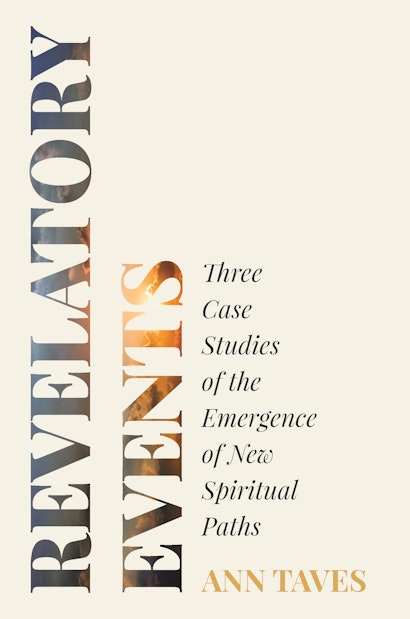Unseen presences. Apparitions. Hearing voices. Although some people would find such experiences to be distressing and seek clinical help, others perceive them as transformative. Occasionally, these unusual phenomena give rise to new spiritual paths or religious movements. Revelatory Events provides fresh insights into what is perhaps the bedrock of all religious belief—the claim that otherworldly powers are active in human affairs.
Ann Taves looks at Mormonism, Alcoholics Anonymous, and A Course in Miracles—three cases in which insiders claimed that a spiritual presence guided the emergence of a new spiritual path. In the 1820s, Joseph Smith, Jr., reportedly translated the Book of Mormon from ancient gold plates unearthed with the help of an angel. Bill Wilson cofounded AA after having an ecstatic experience while hospitalized for alcoholism in 1934. Helen Schucman scribed the words of an inner voice that she attributed to Jesus, which formed the basis of her 1976 best-selling self-study course. In each case, Taves argues, the sense of a guiding presence emerged through a complex, creative interaction between a founding figure with unusual mental abilities and an initial set of collaborators who were drawn into the process by diverse motives of their own.
A major work of scholarship, this compelling and accessible book traces the very human processes behind such events.
Ann Taves is professor of religious studies at the University of California, Santa Barbara. Her books include Religious Experience Reconsidered and Fits, Trances, and Visions: Experiencing Religion and Explaining Experience from Wesley to James (both Princeton).
"[A] fascinating and masterfully interdisciplinary study. . . . With the nuance and erudition made possible by Taves's keen historical eye, firm grasp of the cognitive social sciences, and all of the primary resources now available to scholars of religion, Revelatory Events represents the best of the comparative method in twenty-first century scholarship. . . . This book is highly recommended!"—Adam Powell, Journal of Mormon History
"Revelatory Events is a book that anyone studying new religious movements is going to have to deal with for the foreseeable future. . . . [Taves'] comparative work and sophisticated analysis gives us a model for how good scholarship should be done."—David Feltmate, Nova Religio
"Ann Taves uses her skills as a historian to demonstrate that it is not spiritual experience itself that makes revelatory events, and her skills in cognitive science to unpack how events become revelatory. A deeply fascinating book, Revelatory Events helps us rethink spirituality itself."—T. M. Luhrmann, author of When God Talks Back: Understanding the American Evangelical Relationship with God
"Students of religion have routinely emphasized the importance of exceptional events or experiences—visions or revelations—in the emergence of religious movements. In Revelatory Events, Ann Taves combines history and cognitive psychology in an entirely new way to investigate how small networks of believers can turn an individual's revelation into a social movement, and possibly into a religion. This outstanding book will set the agenda for the psychological and historical study of religious innovation."—Pascal Boyer, author of Religion Explained: The Evolutionary Origins of Religious Thought
"Revelatory Events is Taves at her best. She weaves together careful historical description and insightful psychological analysis to examine the biographical, experiential, and social substrates of new religious systems. This is the kind of brilliant scholarship we have come to expect of Taves."—Robert C. Fuller, author of The Body of Faith: A Biological History of Religion in America
"Revelatory Events offers significant promise for advancing our understanding of the emergence of new religious traditions, and will draw serious interest from scholars in several disciplines."—David G. Bromley, director of the World Religions and Spirituality Project, Virginia Commonwealth University


